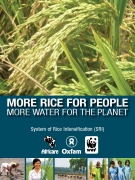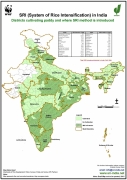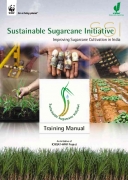/topics/food-and-nutrition
Food and Nutrition
Kisan Swaraj Yatra - A massive outreach effort interacting with farmers and urban citizens about the agricultural crisis and the way out
Posted on 15 Oct, 2010 12:41 PM
The Kisan Swaraj Yatra has been initiated by the Alliance for Sustainable and Holistic Agriculture (ASHA). This is a loose alliance of scores of groups across the country, drawn from more than 20 states. The network consists of farmers’ organizations, consumer groups, women’s organizations, environmental organizations, organic farmers’ cooperatives, individual scientists, doctors, health activists and others.
Politics of food security
Posted on 28 Sep, 2010 11:42 AMThe revelation by the Union Food and Agriculture Minister Sharad Pawar in the Lok Sabha on 26 July 2010 that over 11,700 tonnes of foodgrains worth Rs 6.86 crore were found "damaged" in government godowns is astonishing in a country where many people go without food.
Seeds of Hope – Agriculture and Food Security - A Lokayan and Planning Commission study
Posted on 05 Sep, 2010 10:37 PMThis set of case studies is a part of a book prepared by Lokayan in collaboration with the Planning Commission titled “Seeds of Hope", covering themes of agriculture, biodiversity, education, forestry, governance, health, movements and water. The case studies related to agriculture and food security are summarised below:
Economics of River Flows - A book by Dr.Bharat Jhunjhunwala
Posted on 09 Aug, 2010 06:06 PMThis book is essential reading for economists, power sector officials, power generation companies and environmentalists alike.
Dr.Bharat Jhunjhumwala holds a BSc degree in physics, chemistry and mathematics. He earned his PhD in food and Resource Economics from University of Florida at a tender age of 23 years. He joined Indian institute of management, Bangalore as Assistant professor immediately thereafter. He lived in a slum for two years to understand poverty and organized the Trade Union at IIM during the Emergency. He resigned from the IIM and became a consultant to donor agencies like Swiss Development Cooperation, Oxfam, Care, Overseas Development Institute and others mainly on rural development and watershed issues. He writes a column on economic issues for about 50 newspapers in india. He lives on the banks of River Alaknanda in uttarakhand on the feet of Lord Badri Vishal.
More rice for people - More water for the planet - A WWF-ICRISAT report about System of Rice Intensification
Posted on 02 Aug, 2010 02:08 AM This project report by WWF-ICRISAT begins by highlighting the importance of rice as a major source of calories for half the world’s population and also as the single largest source of employment and income for the rural population.
This project report by WWF-ICRISAT begins by highlighting the importance of rice as a major source of calories for half the world’s population and also as the single largest source of employment and income for the rural population.
It makes connections between rice production and its impact on the environment and argues for need to adopt techniques such as System of Rice Intensification (SRI) to improve produce and reduce the damage to the environment.
For example, current practices at genetic uniformity can make crops more vulnerable to pests and diseases. They are also wasteful of increasingly scarce and costly resources such as water and fossil fuels. Heavily fertilised, continuously flooded rice fields produce greenhouse gases that contribute to global warming, and misuse of inorganic fertilisers and agrochemicals results in soil and water pollution. Evidence indicates that there has been a gradual slowdown in the yield gains of rice in many countries.
System of Rice Intensification and Paddy Cultivation - Maps developed by the WWF-ICRISAT Project
Posted on 14 Jun, 2010 06:23 PM Paddy, one the country's staple crops is cultivated all over the country, barring parts of Jammu and Kashmir, Gujarat and Rajasthan. This set of interesting maps about Paddy and System of Rice Intensification (SRI) from the SRI India website, maintained by the WWF-ICRISAT Project (a joint initiative of WWF and ICRISAT), give a bird's eye view of the districts under Paddy and SRI Paddy cultivation, and the Paddy productivity in various districts of the country.
Paddy, one the country's staple crops is cultivated all over the country, barring parts of Jammu and Kashmir, Gujarat and Rajasthan. This set of interesting maps about Paddy and System of Rice Intensification (SRI) from the SRI India website, maintained by the WWF-ICRISAT Project (a joint initiative of WWF and ICRISAT), give a bird's eye view of the districts under Paddy and SRI Paddy cultivation, and the Paddy productivity in various districts of the country.
Districts with Paddy cultivation and where SRI approach has been introduced: Of the total 604 districts in India, paddy is cultivated in 564 districts. Of these, in 246 districts, SRI paddy cultivation approach has been introduced (data as of 2010). The spread of SRI has been most widespread in Uttarakhand, Eastern Madhya Pradesh, Orissa, Jharkhand, West Bengal, Andhra Pradesh, Tamil Nadu and Karnataka, as 50-95% of the districts in these regions/states have presence of SRI.
Irrigation water management for food security in India: The forgotten realities - Paper by IRAP
Posted on 09 Jun, 2010 06:14 PMIn this paper, the authors examine the current debates around India's water crisis and its implications for food security in the country. The paper takes a critical look at the recent official assessments of groundwater exploitation in India in the context of these debates.
The paper proposes that there is a need to make a qualitative assessment of the magnitude of food security and water management challenges facing the country. It argues that two important factors drive the agricultural growth and food production in India. These include access and availability of arable land and water resources, which need to be examined and analysed with particular reference to their regional variations, to get a true understanding of the situation.
Sustainable Sugarcane Initiative - Improving Sugarcane Cultivation in India - Training Manual developed by WWF India and ICRISAT
Posted on 09 Jun, 2010 01:25 AM Sustainable Sugarcane Initiative (SSI) is an approach to the cultivation of sugarcane, that can reduce inputs - water, chemical fertilizers, seed material and farm space - while improving sugarcane production significantly. It also reduces crop duration and provides a longer period of the cane crushing season to the sugar industry.
Sustainable Sugarcane Initiative (SSI) is an approach to the cultivation of sugarcane, that can reduce inputs - water, chemical fertilizers, seed material and farm space - while improving sugarcane production significantly. It also reduces crop duration and provides a longer period of the cane crushing season to the sugar industry.
This farm-based approach (as opposed to crop-based) also gives farmers options to grow intercrops, such as pulses to improve their income. Most importantly, SSI reduces the overall pressure on water resources and contributes to recovery of ecosystems. It conserves soil moisture, thereby allowing for growing of dryland crops in the same region.
SSI is inspired from the successful approach of System of Rice Intensification (SRI) paddy cultivation, which like SSI, originated from farmers and civil society to improve agricultural productivity while reducing pressure on natural resources.
National seminar on water security - Call for papers
Posted on 07 Jun, 2010 01:16 PMOrganizer: Water and Food Equitable Distribution Organisation (WEDO)
Topics:
- Making more surface water available
- Sustainable and enduring solutions for water
Venue: Henry Maudslay Hall, Anna University, Chennai
Description:
WEDO ( Water and Food Equitable Distribution Organisation) is a unique Initiative of professionals and experts with hands-on experience, a Think-tank of the free enterprise with lateral thinking to design and evolve projects on a scientific and technological basis to provide acceptable engineering solutions to be proposed to the nation: Models, designs and plans for Production, storage and distribution of vital resources in India.
Genetic engineering in food and farming, South Against Genetic Engineering, Warangal
Posted on 02 Jun, 2010 05:09 PMOrganizers:
- South Against Genetic Engineering
- Bangalore Film Society
- Era Organics
- ICRA
- Pristine Organics
- Bhoomi Network
- Green Foundation
- Svaraj
Venue: Ashirvad, No. 30 St. Mark's Road Cross, Opp. State Bank of India, Bangalore 560 001




